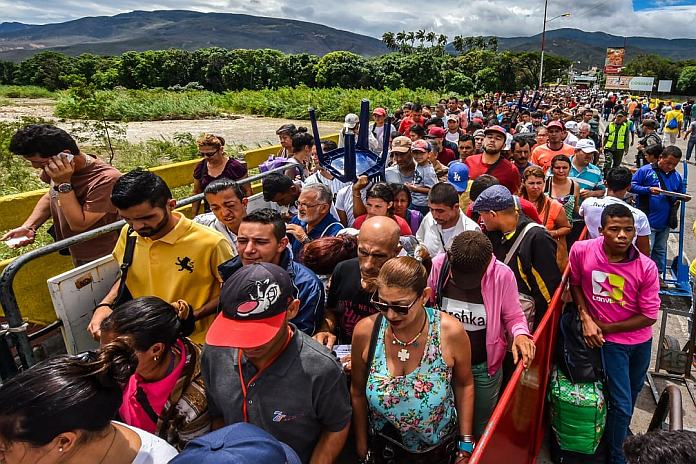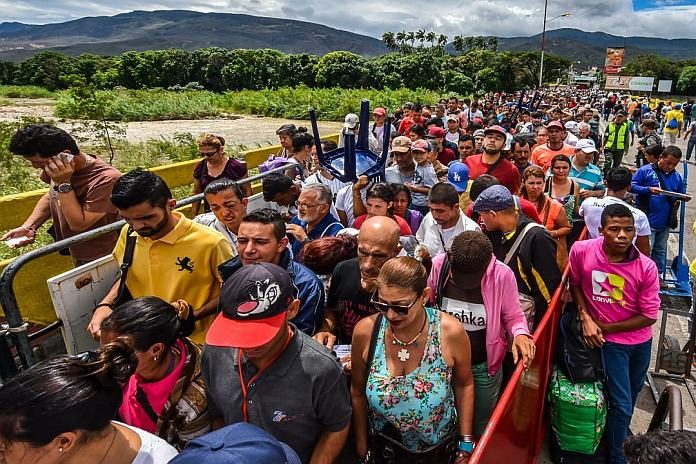Spain contributes 1 million Euros to the MIRPS Fund


Some 25.000 Venezuelans cross to Colombia and return to their country daily with food, consumables and money from ilegal work, according to official sources. Also, there are 47.000 Venezuelans in Colombia with legal migratory status and another 150.000 who have already completed the 90 allowed days and are now without visa. / AFP PHOTO / Luis Acosta
CENTRAL AMERICA / MEXICO – The General Secretariat of the Organization of American States (OAS) welcomes the contribution of 1 million euros announced by Spain to the Voluntary Fund for the Comprehensive Regional Protection & Solutions Framework (MIRPS, for its Spanish acronym), established to support Belize, Costa Rica, El Salvador, Guatemala, Honduras, Mexico and Panama in their response to the crisis of displaced persons, migrants and refugees in Central America.
Based on the principles of solidarity and shared responsibility, the MIRPS is a cooperation mechanism of the Global Compact for Refugees, which is coordinated by the OAS Department of Social Inclusion (DIS) in coordination with the United Nations High Commissioner for Refugees (UNHCR) regional office.
The announced contribution is in addition to the support that Spain has provided to the Central American countries and Mexico since it assumed the first presidency of the MIRPS Support Platform, between June 2020 and June 2021. That period included various activities such as the first Solidarity Event to mobilize contributions and raise awareness about the situation of people in vulnerable situations and the communities that host them, which took place in Costa Rica in June 2021.
The secretary-general of the OAS, Luis Almagro, pointed out that “this first contribution of Spain to the MIRPS Fund represents a milestone at the regional level in terms of solidarity and shared responsibility, while at the same time serves as an impetus to the protection responses and solutions MIRPS countries are providing to alleviate the situation of displaced people and the communities that host them.”
For her part, ambassador Carmen Montón, permanent observer of Spain to the OAS, pointed out that:
“Spain wants to address, under the principle of shared responsibility, the drama of forced displacement in Central America, a reality that is especially prevalent in women, in boys and girls. That is why Spain is making this pioneering contribution of one million euros to the OAS MIRPS Fund, which we hope will serve as a catalyst for other contributions. We will continue to strengthen multilateral alliances to join forces and mobilize resources. In addition, from Spain we appeal to the international community to demand greater attention to this phenomenon and to redouble efforts, because the option to migrate must be a freely chosen option and not the only way out in the absence of opportunities.”
The MIRPS Fund was created on May 27, 2020, by mandate of the OAS Permanent Council in response to the urgent humanitarian situation in Central America, to mobilize resources to address the structural causes of the forced displacement crisis and implement durable solutions to the situation of displaced persons in the region.
MIRPS works in the following areas, among others:
- Addressing the structural causes of forced displacement:
- Strengthening reception and admission mechanisms, and national asylum systems:
- Supporting to host countries and communities, and
- Generating lasting and dignified opportunities for forcibly displaced people.
The MIRPS supports States in the implementation of their commitments regarding international protection and mobilizes resources for the implementation of actions in favor of displaced persons and their host communities.
For its part, the MIRPS Fund is a mechanism for collecting and channeling financial resources to meet the protection needs of thousands of people who, year after year, are forced to move in Central America.
Source: caribbeannewsglobal.com


